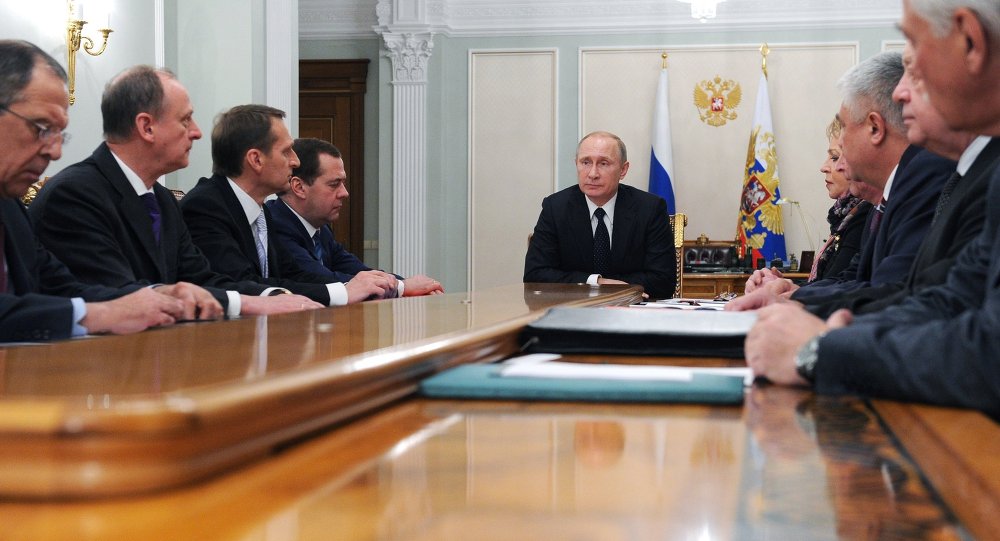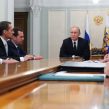
Russia’s 2015 National Security Strategy
Publication: Eurasia Daily Monitor Volume: 13 Issue: 7
By:

Russia’s new National Security Strategy (NSS), signed into law by President Vladimir Putin on December 31, 2015, marks the culmination of a long process in deteriorating relations between Moscow and Washington and in how the Russian security elite perceives the North Atlantic Treaty Organization (NATO). The security document itself must be assessed in this context, as well as with the understanding of how and why the new strategy was formulated. The Kremlin explicitly denoting the United States and NATO as threats to Russia’s security has longer-term implications concerning the limits of future cooperation (see EDM, January 4, 5, 7).
According to Russian law, the NSS must be updated every six years. As the previous version was signed by then-president Dmitry Medvedev on May 12, 2009, the new NSS had to be completed by the end of 2015 (Vesti, October 22, 2015). Drafting the NSS is conducted under the Russian Security Council (SC). The first signs of its activity occurred in February and March 2015, following the United States releasing its own 2015 NSS. The SC was clearly working toward revising the Russian NSS throughout the year: reportedly, Putin officially ordered its adjustment on July 3, 2015. Putin told the SC that Russia must implement systemic measures to respond to the changing situation in the world. By October 2015, the SC Press Service confirmed that the council’s interdepartmental commission for strategic planning had reviewed the NSS. Two months of tinkering followed before the draft NSS was sent to Putin, who, in turn, delayed signing it into law until the last day of 2015 (RBK, December 31, 2015).
Earlier, the Russian SC met in March 2015 to review the US NSS. The main conclusion was that the US document is inherently “anti-Russian” with its repeated references to “Russian aggression.” Predictably, Moscow objected to the interpretation of the Ukraine crisis as outlined in the US NSS. Dmitry Peskov, the Presidential Press Secretary, said that “all threats to Russia’s national security will be considered and dealt with and, if necessary, be amended in the founding documents.” Moreover, the SC believed the US NSS is rooted in promoting Washington’s “global hegemony” and essentially keeping Russia down. Its members also considered the alleged US role in promoting “color revolutions” and concluded that Russia’s new NSS should reciprocate but not copy the American strategy (Vzglyad, March 26, 2015).
In May 2015, SC Secretary Nikolai Patrushev confirmed that work was underway to update the NSS and the doctrine of information security. Patrushev played a prominent public role in the process, and his critical remarks regarding US policy and NATO expansion were clear signals concerning the tone to be framed within the 2015 Russian NSS (Rossiyskaya Gazeta, December 22, 2015). Patrushev further justified the underlying need to revise the NSS: “This is due to the emergence of new military dangers and threats. These manifestations can be seen in the events of the ‘Arab Spring’ in Syria and Iraq, the situation in Ukraine and around it. There is a tendency of displacement of military dangers and threats in the information field. In the struggle for their interests, leading countries in the world have used indirect action, using the protest potential of the population, radical and extremist organizations, private military companies,” Patrushev explained (Grani.ru, December 31, 2015).
The 2015 NSS contains a great deal that portrays the US and NATO in negative terms and is frequently contradictory. The 2009 version includes reference to the US and NATO and therefore there is continuity between these documents; however, the 2015 NSS is more openly critical. Although the drafting took place in 2015 against a background of the Ukraine crisis, the document’s overall views are well known in Russian security circles. The 2015 NSS accuses Western powers of flouting international law and setting out to intervene in a number of countries to change their regimes, consequently spawning terrorism (Islamic State) and destabilizing the international security environment. Nevertheless, the NSS offers commitment to arms control, nuclear deterrence and international security frameworks and recognizes the importance of US-Russia relations (Vedomosti, December 31, 2015). It also offers cooperation with NATO, but on Moscow’s terms. The NSS blames the US and the European Union for the Ukraine crisis; in particular, it paints the EuroMaidan events as a Western-sponsored “color revolution” and a potential threat to Russia’s security. The document’s section on “national defense” makes no reference to “reform.” While the accusation that the US is constructing “military-biological” laboratories in the Commonwealth of Independent States (CIS) betrays paranoia and heightened anti-Americanism (Kremlin.ru, December 31, 2015).
In early December, NATO offered membership to Montenegro, and Russian media coverage stayed focused on the “threat” to Russia of Alliance enlargement. The 2015 NSS notes, “The defining factor in relations with NATO remains the unacceptability to the Russian Federation of the Alliance’s increase in military activity and the proximity of its military infrastructure to Russia’s borders, the creation of a missile defense system and attempts to assume global functions in breach of international law.” But it adds: Russia “is ready to develop relations with NATO on the basis of equality to strengthen overall security in the Euro-Atlantic region. The depth and substance of these relations will be determined by the Alliance’s willingness to take into account the Russian Federation’s legitimate interests in its military-political planning and to respect international law” (Kremlin.ru, December 31, 2015).
On the role of the US, it states: “Russia is growing stronger against a backdrop of new threats to national security that are complex and interrelated. The Russian Federation’s pursuit of an independent foreign and domestic policy is leading to countermoves by the USA and its allies as they attempt to maintain their domination in global affairs. Their policy of restraining Russia takes the form of exerting pressure through political, economic, military and information means.” And also includes: “The Russian Federation is interested in building a fully-fledged partnership with the US on the basis of coincidence of interests, including economic, and with account for the key influence of Russian-American relations on the international situation in general. Vital areas of such a partnership remain the improvement of international treaty mechanisms for arms control, strengthening of confidence-building measures, solutions to non-proliferation issues with weapons of mass destruction, expansion of cooperation against terrorism, and settlement of regional conflicts” (Kremlin.ru, December 31, 2015).
Thus, the 2015 NSS presents a familiar Russian security interpretation of Western interventions in Yugoslavia, Iraq, Afghanistan and Libya, which had destabilizing impacts, while offering little concrete response (Politrussia, January 6, 2016; Rossiyskaya Gazeta, December 22, 2015).




